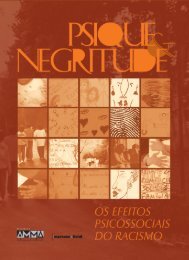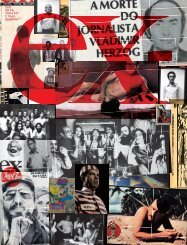CLÁSSICOS BRASILEIROS BRAZILIAN CLASSICS - Imprensa Oficial
CLÁSSICOS BRASILEIROS BRAZILIAN CLASSICS - Imprensa Oficial
CLÁSSICOS BRASILEIROS BRAZILIAN CLASSICS - Imprensa Oficial
You also want an ePaper? Increase the reach of your titles
YUMPU automatically turns print PDFs into web optimized ePapers that Google loves.
Brazilian Classics<br />
A selection of authors with works in public domain<br />
44<br />
CRUZ E SOUSA<br />
(1861 – 1898)<br />
Black poet, Black Dante, Black Swan... not a<br />
few epithets have been assigned to this poet<br />
died in 1898, who has already been compared<br />
to Mallarmé, Baudelaire, Stefan George,<br />
and Lautréamont, among other writers of<br />
international importance. At the time when<br />
naturalism and the Parnassianism gave direction<br />
to the literary canon in the country, the<br />
publication of Broquéis started the Symbolist<br />
movement in Brazil. Cruz e Sousa (a son of<br />
emancipated slaves who, in spite of that, received<br />
an aristocratic education and openly supported<br />
the abolitionist cause) gave it an entirely singular<br />
characteristic. If Cruz e Souza's originality derives<br />
from his creative skills and dedication, it is also<br />
true that life tragedies had no less importance for<br />
the formulation of a poetry that was at one time<br />
meditated and neuralgic, or else, as it has already<br />
been said of it, wild. Through him, by means of a<br />
logical imagination detachment and a significant<br />
multiplicity of the language, the subjectivity<br />
opens up, painfully, to an enigmatic cosmic and<br />
ontological violence.<br />
Review<br />
Main works<br />
Excerpt<br />
Walled in<br />
Which undergrounds had I already come from,<br />
which appalling roads, tottering with exhaustion,<br />
the legs shaking under the fatigue of one century,<br />
repressing in the tremendous ond majestic Hells<br />
of Pride the lacerated heart, always hearing<br />
everywhere the clamor from the vain and idle<br />
mouths: Wait! Wait! Wait!<br />
Which highways have I walked by, stiff monk<br />
of disillusions, knowledgeable of ices and the<br />
foundations of Pain; of this strange, formidable,<br />
terrible Pain, which sings and moums Requiems<br />
in the woods, in the seas, in the winds, in the<br />
storms; lonelily and gloomily hearing: Wait!<br />
Wait! Wait!<br />
That is why this suggestive hour meant then to<br />
me the hour of Hope, which evoked whatever I<br />
had dreamed of and faded away and wondered<br />
and dived into the Void...<br />
A singular clairvoyance<br />
Cruz and Sousa was the Brazilian stylization or reaction in lace of an eminently French Symbolism. In the dialectical<br />
process of the great black poet's work, one finds the more typically Brazilian note of a movement that used to be French.<br />
The condition of being ethnically marginalized, 'walled in', worsened by his physical weaknesses, provided him with a<br />
weltanschauung in such a peculiar way as to place him conveniently far from his French fellow poets. Even from those who,<br />
like Baudelaire, had an influence on him.<br />
(Eduardo Portella, "Aventura e desengano da periodização literária")<br />
Measuring the impossible<br />
"Through the eyes of the symbol, the visionary poet penetrates the invisible and tries to name that which is unspeakable;<br />
however, in so doing, he starts measuring the impossible that, ever since the symbolism, besets all great poetry. Both<br />
the white forms and the night of Cruz e Sousa hazard filling out this same emptiness, the unspeakable of the symbolic<br />
experience, the hollow of the eye, sometimes only silence."<br />
(Davi Arrigucci Jr., "A noite de Cruz e Sousa")<br />
Tropos e fantasias (1885); Broquéis (1893); Missal (1893); Evocações (1898); Faróis (1900); Últimos sonetos (1905); Obras<br />
(1943); Sonetos da noite (1958); Obra completa (1961).









